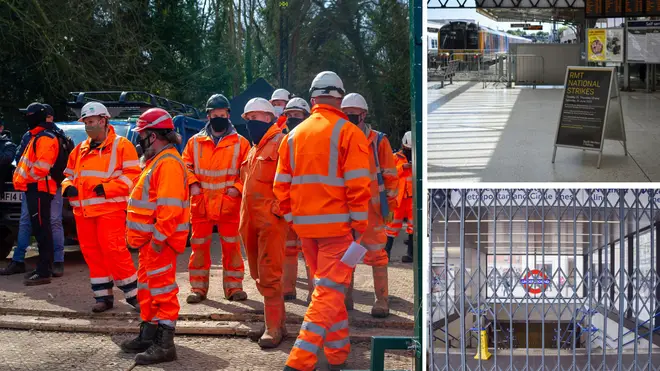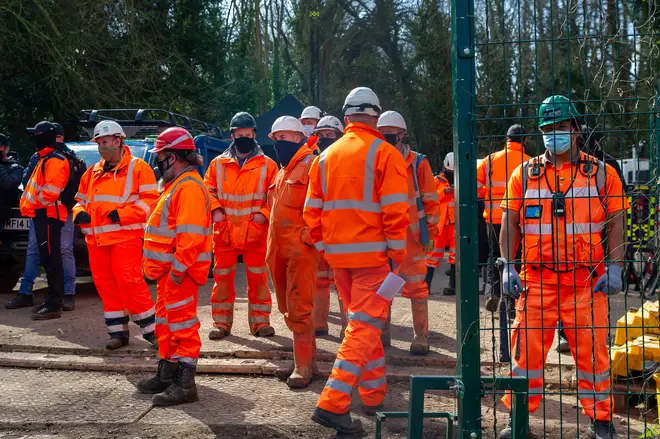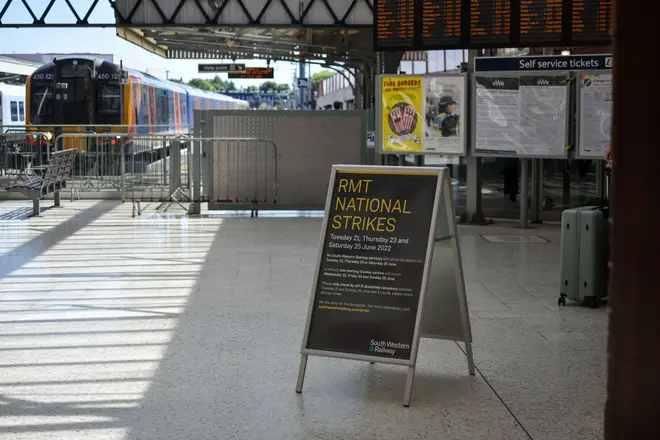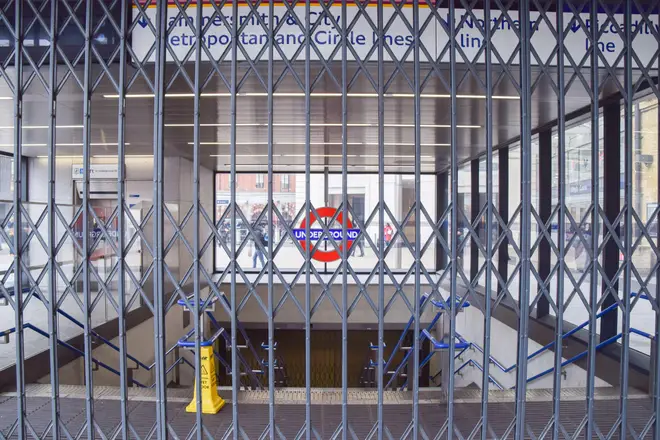
Nick Abbot 10pm - 1am
22 June 2022, 06:48 | Updated: 22 June 2022, 08:40

The RMT has been accused of defending a host of archaic rules, including requiring nine people to "change a plug socket" and "walking time allowances" for one minute walks.
Industry sources told the Telegraph they were unable to "roster individuals", only teams of people.
It means teams of up to nine people are required to do jobs that one person could do, the insider said, citing the example of changing a plug socket.
"Eighty per cent of the most common infrastructure faults could be fixed by small, multi-skilled teams," the source said.
Read more: Labour off the rails: MP's revolt against picket line ban as Starmer faces strike backlash
Read more: Don't rise to Tory bait, the rail strikes are their fault, Alistair Darling tells Labour
Insiders also told the paper staff would get a "walking time allowance" of 12 minutes to walk from their trains to the messroom for their break, even if the walk was only one minute, and engineers are unable to go more than 500 yards from their dedicated patch.
Some teams also refuse to share vans, they said.
The sources claimed these are all practises the RMT is defending.

Chief executive of Network Rail Andrew Haines has previously said the railways are characterised by "poor productivity".
The company said there would be no compulsory redundancies and is looking for its staff to "multitask" in order to fix the issues.
But on Tuesday RMT boss Mick Lynch said redundancy notices had been issued by Network Rail on Monday night.
"They said they'd get us back to talks and they'd make a revised offer," he told LBC.
"But they haven’t done that at all, they've issued me a letter saying that thousands of our people are going to be made redundant."
He added: "[Members] are sick of government ministers coming on the media and telling a pack of lies about our people and a pack of lies about this industry, and we'll challenge that every time we hear it."
Read more: Scottish Labour leader defies Keir Starmer to stand on picket line
Watch: 'I've had it up to here with this Labour government!' Andrew Marr on rail strikes 'blame game'
Deputy prime minister Dominic Raab said the strikes were "deeply regrettable" and said the railways needed to be reformed.
"It's deeply regrettable that we've got these strikes," he told LBC's Nick Ferrari at Breakfast.
"Let's remember that the taxpayer, through the government, paid out £16b - or £600 per household - to see the railways through the pandemic.
"We've of course got to reform the way the railways operate given the new ways to working and the effect that has on commuter travel, but there are also old practices which frankly are well out of date and unnecessary which need to be reformed."
About pay, he said the Government was aware of the cost of living challenge but "the one thing that will keep inflation higher for longer and undermine pay packets for longer is if we have spiralling public sector pay increases beyond what is responsible".
Mr Raab also defended pensioners getting a 10 per cent increase while rail workers are offered a below-inflation wage increase.
"The reality is that pensioners are in a different position, we judge them in a bespoke way," he said.
"Their income is disproportionately affected by rising energy costs... we need to take bespoke measures just to see them through these tough times."

Raab: Taxpayer paid to help railways through pandemic
Train services will continue to be disrupted by the strikes on Wednesday as talks resume in a bid to resolve the dispute.
Fewer than one in five trains ran on Tuesday after RMT members on Network Rail and 13 train operators staged the first of three walkouts, with strikes set to follow on Thursday and Saturday.
RMT members on London Underground also went on strike on Tuesday.

Iain Dale: 'Mick Lynch is everywhere across the media at the moment...Where are the employers?'
The joint action caused travel chaos across the UK, with journeys taking longer and roads rammed with traffic as people switched to cars or buses to get to work.
The chaos will continue on Wednesday, with only 60 per cent of trains running, mainly due to a delay to the start of services as signallers and control room staff are not doing overnight shifts.
The RMT will meet with Network Rail and the train companies on Wednesday in another attempt to break the deadlock.
Watch: Rail strike called under 'false pretences' by RMT's '1970s union baron' boss, says Shapps
Read more: Tube and train strikes 2022: What are the rail strike dates for June and July?
RMT general secretary Mick Lynch said the turnout at picket lines on Tuesday was "fantastic" and had exceeded expectations in the union's campaign for job security, defending conditions and a decent pay rise.
He said: "Our members will continue the campaign and have shown outstanding unity in the pursuit of a settlement to this dispute.
"RMT members are leading the way for all workers in this country who are sick and tired of having their pay and conditions slashed by a mixture of big business profits and Government policy.
"Now is the time to stand up and fight for every single railway worker in this dispute that we will win."

A Department for Transport spokesperson said: "These are desperately needed reforms that modernise the railway and put it on a sustainable footing for passengers and taxpayers.
"Unions have shut down big parts of the rail network, hitting local businesses and unfairly cutting people off from hospitals, schools and work.
"However, early data shows that unlike in the past many people now have the opportunity to work from home, so we haven't even a rush to the roads, as traffic has instead gone online, which means the unions aren't having the overall impact they might have hoped."
Read more: PM warns commuters must 'stay the course' despite 'unnecessary aggravation' of strikes
Watch: Furious commuter blocks packed bus as week of rail strike havoc begins
The union has been asked by Network Rail to attend formal consultation talks next month on introducing "modern working practices".
Network Rail official Tim Shoveller said the changes will mean "dumping outdated working practices and introducing new technology".
He added: "We expect this will reduce roles by around 1,800, the vast majority of which will be lost through voluntary severance and natural wastage."

Most adults believe the rail strikes are justified, according to an opinion poll.
A survey of over 2,300 people by Savanta ComRes showed that 58 per cent said the industrial action was justified.
Younger adults aged 18-34 and Labour voters were more likely to see the strikes as justified compared to their older, aged 55+, and Conservative-voting counterparts.
Three out of five of those polled poll said they are generally supportive of the principle of industrial action, while just 35 per cent were generally opposed.
Read more: Angry workers stranded and stations deserted on first day of RMT's crippling strike
Read more: Tory MP calls RMT General Secretary Mick Lynch a 'marxist' and 'waste of space'
Prime Minister Boris Johnson put the public on notice for further strike action as Downing Street said it would "not give in" to demands from the rail unions.
Mr Johnson warned commuters they must be ready to "stay the course" and urged rail bosses and unions to agree on a modernisation package to safeguard the future of the industry.